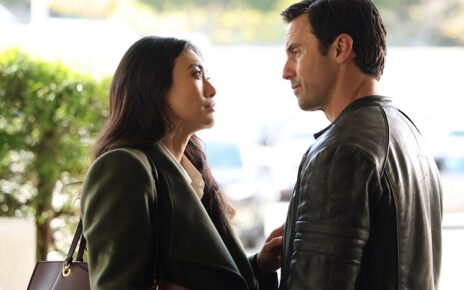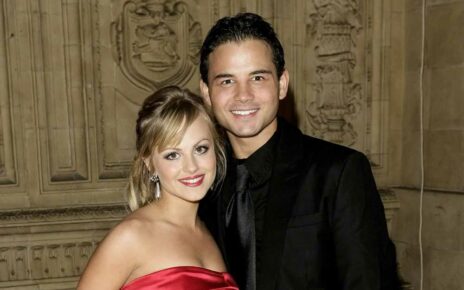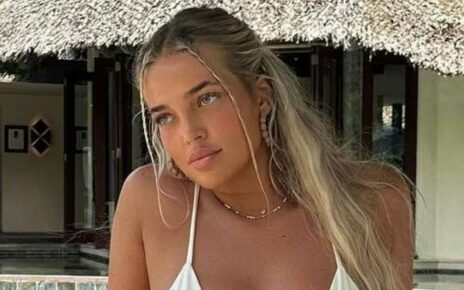
Metro.co.uk’s Pride Takeover has been hearing from voices across the country and the world with important and uplifting stories to share and the challenges through their journeys.
Musician and EastEnders star Heather Peace, known for currently playing former jailbird Eve Unwin in the soap, has been reflective on how far Pride has come through peaceful protests and the importance of allies and media representation.
However, as with many, the road of sexuality was not an easy one, she tells us in a candid conversation.
Admitting that she didn’t know who she was until adult life, she takes us through her story, and the touching words she would send back to her younger self.
What does Pride mean to you?
Pride is a coming together of our community. It’s a chance to celebrate who we are. Over the years it has changed and includes so much more of the wider community. My heart feels so full when I see so many straight allies and their families out in support now, sharing the day and showing their support for equality.
We’ve come so very far with peaceful protest over the years but must hold onto what we’ve achieved and make sure we never go back. Never have I felt so worried about the rights of the LGBTQ+ people being rolled back. In today’s climate, complacency is not an option.
What is your most notable memory of Pride?
It’s probably my first ever London Pride (now Pride in London) when I was just 19 years old and in my first lesbian relationship.
It was 1995. Coming out back then was very different. Section 28 was still in place and the law did not recognise our relationships at all. Marching past the Houses of Parliament will be forever etched on my memory.
The deafening sound of tens of thousands of rainbow whistles in unison; drums banging; chanting about Section 28. It made me feel angry but I had a sense of euphoria at the same time. I felt part of a movement that I knew was going to change things.
Can you take us through some of your journey, whatever you may consider that to be?

I was brought up Catholic. It’s a difficult road, sexuality, if you’re straight, never mind gay.
The result was that I honestly didn’t have a clue who I was until my first kiss with a woman on Canal St in Manchester when I was 19 years old. After this everything fell into place. I remembered friendships with girls that were intense; my obsession with the Argentinian tennis player Gabriella Sabatini even though I didn’t play tennis; the fact that I’d never fallen in love up until now, even though I had had perfectly lovely boyfriends.
I suddenly understood what friends had felt for years; feeling tongue tied; saying the wrong thing; suddenly not being able to find the words at all. Women absolutely floored me in a way no man had ever done.
I still didn’t accept that I was a lesbian, I wouldn’t do that until my first girlfriend left, 18 months after our relationship had begun, leaving me utterly heartbroken for the first time, and unsure of what the hell I was going to do next. I hadn’t told my parents yet.
A good friend of mine at drama school saw that I was in a bad way and decided she should drive me home (across the M62 from Manchester to Bradford) to come out to my parents. I absolutely needed them.
It was the right decision, they were amazing. I remember my Mum saying ‘Don’t ever keep anything from me again, you’ve spent the last 18 months just talking about the weather!’
What advice would you give to younger self?
Right now, coming out, you feel sad that you’ll never be able to marry. You feel sad that you’ll never have kids. You’re pretty old-fashioned in lots of ways and I know it’s hard feeling like you’ll be letting go of all of this. But it’s going to change.
There’s going to be huge changes. You might not believe it now, but you will marry. You’ll have three kids. And a wife. And be like every other family in your local community. And, crucially, they won’t see your family as any different to theirs.
Trust your heart. It will all be ok. I promise
How do you think TV and media represents LGBTQ+ characters and issues?
This is a hugely broad question that would need an essay to answer properly.
The representation of LGBTQ+ characters has hugely grown and we’re seeing more intertwining of these characters into mainstream shows all the time. We’re seeing characters who just happen to be LGBTQ+ and it’s not always central to the story, and that’s good.
My favourite recent lesbian character would have to be Andrea Martel in Call My Agent played by Camille Cottin. It’s so good to see such a three-dimensional, formidable character who just happens to be lesbian. It’s refreshing and it’s happening more and more. Times are changing but it’s important that we don’t stop as it is so important to the audience to see themselves represented on screen.
How are you enjoying playing Eve; what does the character mean to you?

I’m loving playing Eve. She’s strong, intelligent, funny & loyal. She’s becoming more interesting the further into the show I am. Scenes going out at the end of June show a more emotional and vulnerable side of the character. It’s a lovely thing to read scripts and see the writers really getting to know her; I’m excited to see what’s in store for her later in the year.
I love working with the cast and crew, it’s a great place to work and I’m super fond of the people there.
How important do you think it is to have LGBTQ+ stories and characters in soaps and serial dramas
I think soaps and serial dramas have to represent our lives here in the UK and I think EastEnders does a really great job. I think it’s important that we see who these characters are, moving beyond the one-dimension and characters are not defined by their sexuality.
It’s important that all people feel like they see their communities represented on TV. It’s important for our young people. It’s been such an important part of (and I hate saying this word) ‘normalising’ us. If we don’t see LGBTQ+ people represented on TV or indeed in books it makes us different, it ‘others’ us and makes us easy targets for hate.
Metro.co.uk celebrates 50 years of Pride
This year marks 50 years of Pride, so it seems only fitting that Metro.co.uk goes above and beyond in our ongoing LGBTQ+ support, through a wealth of content that not only celebrates all things Pride, but also share stories, take time to reflect and raises awareness for the community this Pride Month.
MORE: Find all of Metro.co.uk’s Pride coverage right here
And we’ve got some great names on board to help us, too. From a list of famous guest editors taking over the site for a week that includes Rob Rinder, Nicola Adams, Peter Tatchell, Kimberly Hart-Simpson, John Whaite, Anna Richardson and Dr Ranj, we’ll also have the likes Sir Ian McKellen and Drag Race stars The Vivienne, Lawrence Chaney and Tia Kofi offering their insights.
During Pride Month, which runs from 1 – 30 June, Metro.co.uk will also be supporting Kyiv Pride, a Ukrainian charity forced to work harder than ever to protect the rights of the LGBTQ+ community during times of conflict. To find out more about their work, and what you can do to support them, click here.
Metro.co.uk celebrates 50 years of Pride
This year marks 50 years of Pride, so it seems only fitting that Metro.co.uk goes above and beyond in our ongoing LGBTQ+ support, through a wealth of content that not only celebrates all things Pride, but also share stories, take time to reflect and raises awareness for the community this Pride Month.
MORE: Find all of Metro.co.uk’s Pride coverage right here
And we’ve got some great names on board to help us, too. From a list of famous guest editors taking over the site for a week that includes Rob Rinder, Nicola Adams, Peter Tatchell, Kimberly Hart-Simpson, John Whaite, Anna Richardson and Dr Ranj, we’ll also have the likes Sir Ian McKellen and Drag Race stars The Vivienne, Lawrence Chaney and Tia Kofi offering their insights.
During Pride Month, which runs from 1 – 30 June, Metro.co.uk will also be supporting Kyiv Pride, a Ukrainian charity forced to work harder than ever to protect the rights of the LGBTQ+ community during times of conflict. To find out more about their work, and what you can do to support them, click here.
Source: Read Full Article


